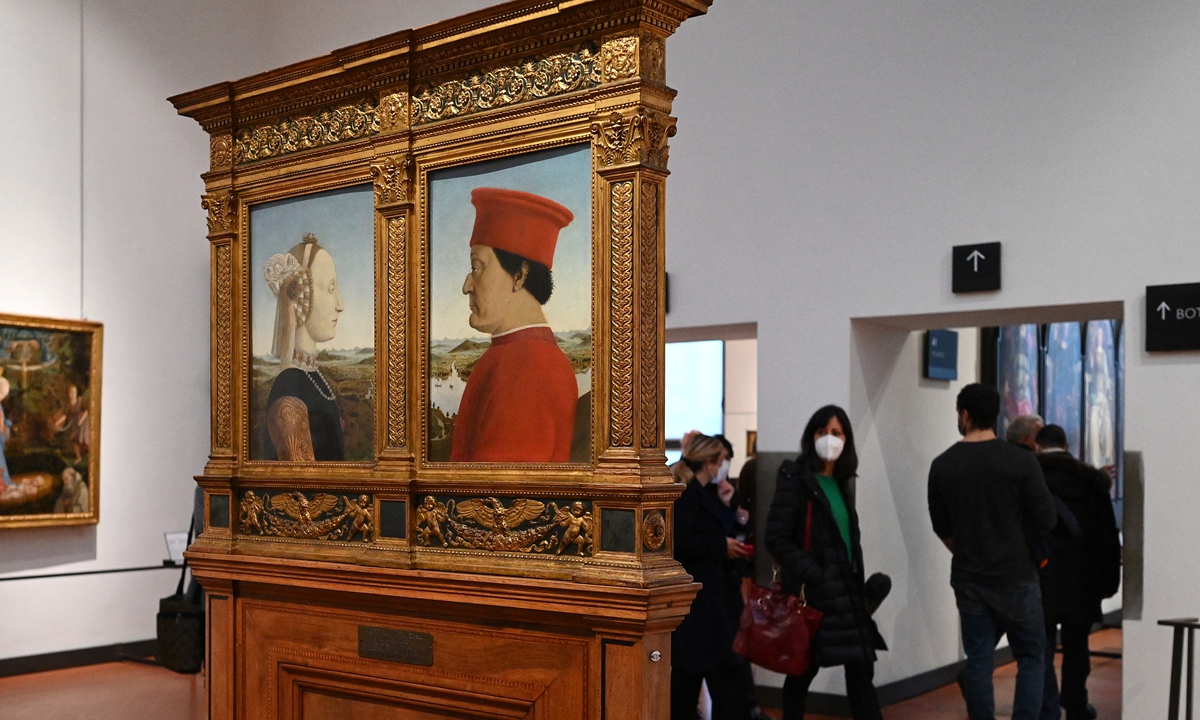
Visitors view Piero della Francesca's 1472-75 Portraits of the Duke and Duchess of Urbino on January 21 during the reopening of the Uffizi Galleries in Florence, Tuscany, Italy. Photo: AFP
Florence's Uffizi Galleries, internationally recognized as home to one of the world's greatest art collections, is getting a lot bigger - geographically.
The Uffizi, Italy's most visited museum, has launched an initiative to "scatter" the riches of its collection around Florence and other parts of Tuscany.
Dubbed the "Uffizi Diffusi" (scattered Uffizi), the plan is to create new tourist destinations throughout the central Italian region both to allow easier social distancing in the palaces that house the storied Uffizi in central Florence, and over the long haul to combat overtourism that has plagued Italy's most popular tourist attractions, which include Florence, Rome and Venice.
Among the first exhibitions launched under the five-year initiative is one dedicated to the poet Dante Alighieri in Poppi, a hilltop village near the Tuscan city of Arezzo. The exhibition is part of a wider celebration marking the 700th anniversary of the death of Dante, who wrote parts of his epic poem "Divine Comedy" in Poppi.
Also on the agenda are an exhibition centered on Renaissance painter Andrea del Castagno in San Godenzo, the town in northern Tuscany where he was born; an exhibition on self-made soldiers in the Tuscan village of Anghiari; and a collection of works inspired by the early Renaissance master Giotto in Montespertoli.
There will also be an exhibition dedicated to France's Napoleon Bonaparte on the Tuscan island of Elba, where the military leader was exiled. The year 2021 marks the 200th anniversary of Napoleon's death.
"You cannot look at works of art in isolation," Eike Schmidt, the Uffizi's director, told the Xinhua News Agency.
"To be able to look upon the work of Andrea del Castagno in the landscape that inspired him is something worth a special trip."
The "Uffizi Diffusi" initiative was for the most part planned during the COVID-19 lockdown, when the doors of the museum were closed in compliance with coronavirus health rules.
The idea is to allow more people to see the Uffizi's rich collection of art without overcrowding. Schmidt expects the initiative to help transform tourism into "something more ecologically and socially sustainable" than the system in place before the pandemic, when long lines of visitors had to wait to enter the Uffizi.
Schmidt believes the plan can serve as a blueprint for other parts of Italy and even for other countries with similar concerns.
Author and art critic Antonio Russo agreed that the Uffizi's initiative could be the start of a new trend.
"Some have pointed out that the Uffizi is keeping its most important works at home, but this is at least in part due to security concerns over the well-being of these priceless works," Russo told Xinhua.
"The important thing is that the vast collection of the Uffizi will be scattered across Tuscany. If it is successful, it will inspire more initiatives like this and perhaps in the future we will look back and wonder why nobody did this sooner."




